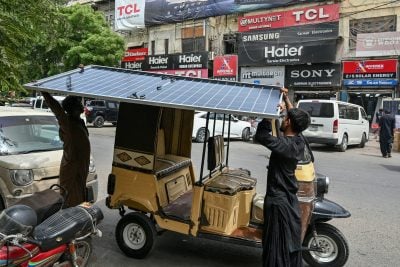Over the last year, coronavirus has disrupted life as we know it. Recent graduates in developed economies are facing uncertain job prospects. In the US, the unemployment rate for young people (16-24) is currently 11.5%, nearly double the overall unemployment rate of 6.7%, according to the Department of Labor.
A UK survey of graduates in May 2020 revealed that 26.1% had lost their work placement or internship, 29.2% had lost their job and 28.2% had their job offer deferred or cancelled.
As terrible as these numbers are for recent graduates in the US and UK, it took a once-in-a-century pandemic to reach these levels. In sub-Saharan Africa, college graduates face these stark numbers even in normal times.
In Kenya, university graduates must resort to odd jobs as a means of survival, with no discernable path toward formal employment. The 300,000 young people who enter Nigeria’s workforce every month encounter an economy incapable of producing enough jobs to absorb them. In 2020, South African youth unemployment hovered at around 55%.
For African youth – whether college graduates or not, their formal jobs prospects present an infinite wasteland with no viable end in sight.
How do we create jobs for our youth? It is my belief that beyond the rise in services, and the growing tech sector, African jobs are going to come from agricultural value chains, mining value chains, and light manufacturing.
A combination of these sectors in a country’s industrial policy should help deliver the economic growth and jobs required. For this piece, I want to focus on agriculture.

Cultivating opportunities
As currently practiced, African agriculture – small-scale, non-mechanised, non-irrigated, lacking input, with low farm-gate prices that are at the mercy of middlemen – holds no attraction for the youth in African countries.
However, a fully developed agriculture value chain, from managing directly cultivated crops to processing products for domestic or regional consumption, would provide an excellent opportunity to absorb a significant portion of Africa’s labour force.
In January 2020, Twiga Foods, a Kenyan agritech business-to-business food distribution company, placed a call for contract farmers, providing the clearest example of the role agriculture could play in job creation.
To qualify, farmers needed to own or lease 50 acres of land (ruling out smallholders), the land had to be irrigated or the owners needed to be willing to self-finance irrigation infrastructure, and the land had to be accessible by a main road and fenced. In return, Twiga offered a market for the produce at competitive prices. It connects farmers to agronomic and water management services through its partners.
In the future, there could be a large number of agricultural entrepreneurs developing 50-acre parcels of land, providing high-quality produce directly to local markets, or to processers who add value and sell into regional or international markets.
To create an ecosystem in which agriculture creates jobs and contributes to food security requires a collaboration between the state and private actors. Entrepreneurs who do not personally own land and yet wish to respond to Twiga’s call in Kenya would immediately run into the problem of finding land with clean title. Land tenure challenges in Kenya, as elsewhere on the continent, have led to conflicts, causing not only violence but also poverty and economic instability.
The same holds true for a group of smallholders who have plans to form a cooperative, pool their land holdings and apply to become contract farmers for a B2B firm like Twiga. Without clear, verifiable ownership claims, they will be unable to meet the qualification criteria or secure financial products necessary for such an endeavour.

The prevailing, overlapping land claims among families, clans, tribes, districts, regions and the national government have made modernising agriculture difficult. According to the Africa Centre for Economic Transformation (ACET), “only a small proportion (about 10%) of Africa’s land has its ownership legally recognised and documented”.
Clear land tenure provides security of investment for an entrepreneur who agrees to “self-finance irrigation” in response to the Twiga call. Twiga requires the farm to be fenced and protected – without clear boundaries it is impossible to meet that requirement. For small farmers looking to lease or sell their land and pursue opportunities elsewhere, an inflexible land market, owing to complicated land tenure, makes that impossible.
Improving land tenure would contribute to freeing up labour from unproductive subsistence activity while improving agricultural output.
Drones and AI move Africa’s farmers to greener pastures
Cheese could be the topping for Rwanda’s agricultural exports
Successful agricultural enterprises and smart policy: Eight case studies
Finance challenges
A prospective agripreneur responding to Twiga’s call needs specialised financial products designed to reflect the unique risks and timeline of agriculture. Commercial agriculture on the scale required to generate jobs requires financial services that can support larger agriculture investments and agriculture-related infrastructure that requires long-term funding (given that currently transportation and logistics costs are too high, especially for landlocked countries).
Agricultural insurance is crucial in Africa, where agriculture has to be resilient to the effects of the changing climate. Currently, the use of crop or livestock insurance across the region is low – less than 10%. Commercial agriculture requires standardised insurance products as a hedge against extreme or erratic rains, floods and drought.
As the sector expands and becomes more complex it will impact domestic and regional patterns of trade and even spur the rise of new industries. Domestic and regional logistics chains will then rise to accommodate the expansion.
The now-prosperous agriculture sector could then trade with other sectors of the economy, creating and supporting jobs. The agricultural sector can then join the tech sector as a basis of domestic capital formation.
African governments and their partners (both bilateral and multilateral) pay lip service to their commitment to agriculture – but the foundational pieces required for a thriving agricultural sector are still lacking.
These partners need to make investments in making land accessible by major roads as smallholder farmers and cooperatives of agripreneurs simply do not have the resources to build and maintain public infrastructure. And these high transport and logistics costs contribute to the low profitability of agriculture.
Agriculture alone will not be a panacea for Africa’s youth unemployment crisis. It is, however, a low-hanging fruit and an underexplored possibility. As the world faces a divergent post-Covid recovery, it is an opportunity to make substantive efforts to leverage the agricultural sector as a source of jobs, value, and food security.
Gyude Moore is a senior policy fellow at the Center for Global Development. He previously served as Liberia’s minister of public works.
Want to continue reading? Subscribe today.
You've read all your free articles for this month! Subscribe now to enjoy full access to our content.
Digital Monthly
£8.00 / month
Receive full unlimited access to our articles, opinions, podcasts and more.
Digital Yearly
£70.00 / year
Our best value offer - save £26 and gain access to all of our digital content for an entire year!

 Sign in with Google
Sign in with Google 





